Friday Feb 13, 2026
Friday Feb 13, 2026
Wednesday, 5 May 2021 00:01 - - {{hitsCtrl.values.hits}}
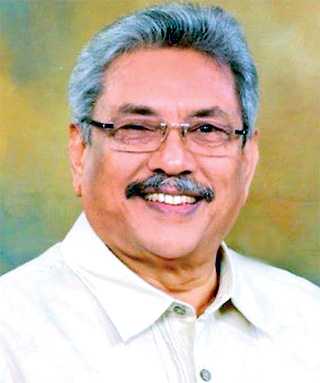
President Gotabaya Rajapaksa
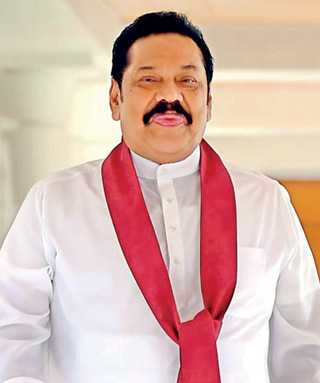
Prime Minister Mahinda Rajapaksa
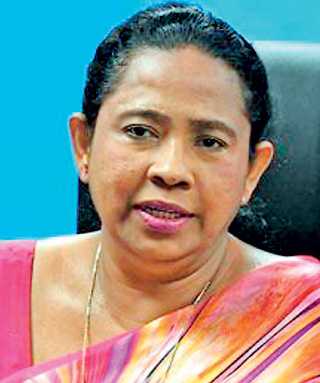
Health Minister Pavithra Wanniaarachchi
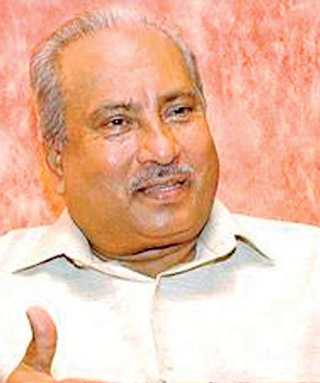
Transport Minister Gamini Lokuge
“Fashion me now a man as princes are, a man ignorant of the laws, almost an enemy of the public welfare...thinking about anything except the safety of the state, and measuring all things by his desire and profit” – Erasmus (Praise of Folly)
By Tisaranee Gunasekara
“Get me out,” read the message a wealthy Indian sent the owner of a private jet company as COVID-19 pandemic engulfed India, and thousands of ordinary people begged for oxygen and died from its lack. The man of means was flown to Dubai, a day before the UAE closed its doors to all travellers from India (Forbes – 27 April).
Since then many countries have imposed travel bans on India. Not Sri Lanka though. Our doors are wide, wide open to any Indian, so long as they can shell out the dollars. A 13-night, full board, two PCR test Quarantine Package begins at just $ 650. According to ads reproduced in the website Mawrata News, the purveyors include such industry luminaries as Jetwing Travels and Fairways.
In an otherwise moribund economy, quarantine tourism is rocking. “The accommodation list quickly expanded from seven to 13 to 20,” writes Namini Wijedasa, including “bungalows, tourist hotels, boutique hotels and villas and guest houses,” in districts ranging from Colombo to Hambantota, Nuwara Eliya to Kegalle. There are plans to permit Pakistanis and Bangladeshis also to benefit from this unique opportunity. The Rajapaksas, who love hubs, seemed to have turned Sri Lanka into the only Quarantine Hub in the world.
The Government, true to form, insists that all Indian travellers using the tourism bubble are tourists or investors. But a controversial social media post by writer William Dalrymple proves that Sri Lanka is indeed a transit point for those who want to flee India, providing they have money and contacts.
Calling it his ‘Great Escape,’ Dalrymple wrote how “as casualties mounted and Facebook filled with funeral pyres...” he decided “it would be prudent to get out...and took advantage of Indian-Sri Lanka air bubble and fled to SL...” (I have not seen the original post. The quote is from a reproduction in the reputed Indian website, The Quint (https://www.thequint.com/entertainment/celebrities/william-dalrymple-apologises-for-post-about-leaving-delhi-to-avoid-covid#read-more).
 Dalrymple and others of his ilk are coming from the biggest COVID-hotspot in the world. What if any of them test positive? What about the safety of hotel employees compelled to cater to these ‘visitors’? If the travellers test positive, will the hoteliers handle their medical care in their own facilities or dump the sick on our overburdened public health system (Lankans are already dying for the lack of an ICU bed or an ambulance)? What guarantee is there that this contemptible attempt to profit from the pandemic will not result in a quarantine tourism mini-cluster?
Dalrymple and others of his ilk are coming from the biggest COVID-hotspot in the world. What if any of them test positive? What about the safety of hotel employees compelled to cater to these ‘visitors’? If the travellers test positive, will the hoteliers handle their medical care in their own facilities or dump the sick on our overburdened public health system (Lankans are already dying for the lack of an ICU bed or an ambulance)? What guarantee is there that this contemptible attempt to profit from the pandemic will not result in a quarantine tourism mini-cluster?
On 3 May, Lanka News Web reported how a woman in Alawwa, who was diagnosed with COVID-19 in the base hospital, was forced to return home using public transport as the hospital was full (she was taken to a treatment centre subsequently). Juxtapose this tragic tale with the even more tragic fate of about 30,000 Lankan migrant workers eking a beggarly existence in the Middle East, waiting for a chance to return home, and the moral turpitude of quarantine tourism becomes undeniable.
Rajapaksas may talk from morn till night about patriotism, but dollars trump rata, jathiya and agama (country, race, and religion) every time. The Gotabaya-Mahinda regime is probably the only government willing to endanger its own citizens for profit.
The question is, are we the only citizenry willing to tolerate such lethal irresponsibility on the part of its rulers? SJB Parliamentarian Kavinda Jayawardane was one of the first to warn about this deadly racket. Will the official Opposition demand answers and explanations in Parliament and hold the Government to account?
When the pandemic is not a priority
On 29 April, a Sri Lankan man, diagnosed with COVID-19, died at home because there was no ambulance to take him hospital. According to a post by a doctor on his Facebook page (and reproduced in Lanka c news), the man and his family had travelled to Trincomalee and Buttala on public transport during the Sinhala and Tamil New Year season.
Had the Government listened to repeated requests by Public Health Inspectors and other medical professionals and imposed travel restrictions at district level during the New Year season, this death may not have happened.
The Government refused to emerge from its denial bubble, even when the first signs of the third wave became apparent, post New Year. “Because we are working hard, by today coronavirus is contained in Sri Lanka while a third wave spreads across the world,” crowed Minister of Health Pavithra Wanniarachchi on 18 April (Lanka c news – 18 April).
President Gotabaya dismissed growing calls from the health sector for some form of lockdown and insisted that vaccination was the only answer, though the country lacked enough vaccine stocks to give the second jab to all those who received the first jab. “Sri Lanka has made remarkable progress in controlling the spread of COVID-19...” Prime Minister Mahinda told the UNESCAP on 26 April, with a straight face. 
“Understand that there were and are so many far more pressing issues for the Modi Government to attend to,” wrote Arundhati Roy in her essay on India’s descent to COVID-19 hell. “Destroying the last vestiges of democracy, persecuting non-Hindu minorities and consolidating the foundations of the Hindu Nation makes for a relentless schedule” (We are witnessing a crime against humanity – Guardian – 28 April).
The Rajapaksas too had and have priorities unrelated – and antithetical – to pandemic control. During the first wave, precious time was lost until the nomination for Parliamentary Elections was concluded. During the second wave, priority was accorded not to the containment of the Brandix cluster but to get the 20th Amendment through the Parliament. A timely district level lockdown could have stymied the second wave at birth. Instead piecemeal closures were imposed and imposed late, making the virus’s work easy.
As the third wave gathers strength, the regime’s focus is on getting the Port City Commission Act through; and silencing dissent through targeted acts of repression.
A lockdown, however necessary to contain the pandemic, will also delay the Port City Commission Act. Beijing seemed to be worryingly keen to get the Act through with no delay, if their shrill propaganda is anything to go by. Perhaps that is why Prime Minister Mahinda assured the visiting Chinese defence minister that the country will not be locked down.
After all, keeping Beijing contented is a matter of life and death for the Rajapaksas. When the Chinese lose face, the Rajapaksas lose their heads, as the honking incident proves.
The young motorist who spearheaded a very peaceful and very orderly honking protest against a road closure for the visiting Chinese Defence Minister was arrested within 24 hours. He was forced to make a public apology, probably to appease lacerated Chinese feelings. Had the Government moved with the same speed to contain the pandemic, we would not be suffering from a third wave today.
It is all a matter of priorities. What is a pandemic compared to the all-important task of ensuring the safety and security of Rajapaksa rule?
So while the third wave was building up, the regime focused on arresting parliamentarian Harin Fernando under the PTA. When he entered hospital for open heart surgery, his sister was questioned by the CID for six hours. (Targeting families is another Rajapaksa speciality. The aged grandmother of Gen Sarath Fonseka’s then son-in-law, Danuna Tilakaratne, was dragged to the fourth floor for the great crime of sheltering her fugitive grandson for one night).
Civil society activist Asela Sampath was arrested reportedly for mocking Minister Bandula Gunawardana’s relief package. According to his revelations, once given bail, he was taken to the Bogambara prison under the guise of quarantining and subjected to cruel and inhuman treatment.
Shani Abeysekara was denied bail yet again. Hejaz Hizbullah and the poet Ahnaf Jazeem remain in detention.
The Government was also busy keeping the ‘Muslim enemy’ in play. Parliamentarian Rishad Bathiudeen and his brother were arrested under the PTA. The Cabinet approved a proposal by Minister Sarath Weerasekara to ban the burqa (burqa is a garment that belongs in the middle ages, but the Government decreeing what women should wear is a dangerous development, the first step down a slope that is as illiberal as the burqa). The Undead Tiger too will be brought out, when possible. In the Rajapaksa playbook, a dose of minority phobia is the panacea for most ills.
Then there is quarantine tourism.
So power and profit. Can anything be more important for the ruling family?
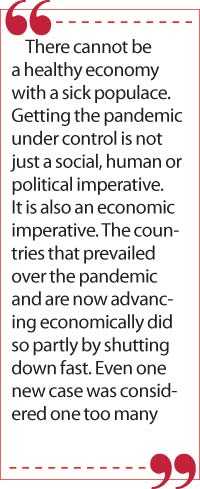 Let them grow turmeric
Let them grow turmeric
President Ranasinghe Premadasa had the 1.5 million housing programme, aimed at providing adequate housing facilities to 1.5 million families.
President Gotabaya Rajapaksa too has his 1.5 million programme. He will be presenting 1.5 families with five potted turmeric plants each.
Marie Antoinette supposedly wanted starving Parisians to eat cake. Gotabaya Rajapaksa wants a populace facing a pandemic to grow turmeric.
In early February, at an official meeting, Basil Rajapaksa said that Sri Lanka should become the first country to vaccinate all its people (Colombo Page – 3 February). Three months later, by May 2nd only 88,088 people (0.4% of the population) have been fully vaccinated.
There cannot be a healthy economy with a sick populace. Getting the pandemic under control is not just a social, human or political imperative. It is also an economic imperative. The countries that prevailed over the pandemic and are now advancing economically did so partly by shutting down fast. Even one new case was considered one too many.
In Sri Lanka, pandemic control seems to have gone from bad to grotesque, with ruling party politicians vetoing lockdown decisions by health officials. For example, the top health official for Kesbewa made a written request from Health Ministry to lockdown the entire Piliyandala police division. The lockdown was announced in the night and revoked the next morning. The revoking reportedly happened on the insistence of Minister Gamini Lokuge. The Minister says there are no COVID patients in Piliyandala town. The health official says there are many unidentified patients moving freely and if a lockdown is not imposed, deaths could mount.
Since the pandemic is a health emergency, it would make sense to listen to the medical official. Not in Sri Lanka. So far the Minister has prevailed. Emboldened by his victory, other local politicians too may enter the fray, intervening in lockdown decisions, taking control away from medical authorities into their own ignorant hands.
With generals and politicians dictating terms to medical authorities, how can we beat back the third wave? At the rate we are going, Sri Lanka might one day become a case study of how not to handle a pandemic.
During the first two waves, no Lankan was immune to the pandemic, because no vaccine was available. The situation is different now. The politicians who are refusing to prioritise the pandemic are also vaccinated against the virus. By refusing to heed medical advice, a vaccinated-elite is endangering the life and health of nearly 20 million citizens who are yet unvaccinated.
The Rajapaksas are a family tree intent on taking root and spreading branch and leaves. For that they need an international patron, and acolyte businesspeople. Keeping those key components of their power project happy is their true priority. They will not focus on the pandemic, because like Donald Trump, Narendra Modi or Jair Bolsonaro, they see no need to do so. If there is public discontent, they will respond in familiar ways – targeted repression and scapegoating minorities.
For Sri Lanka, if the present is bad, the future promises to be infinitely worse. The Rajapaksas have allowed Lankans to be unnecessarily exposed to a deadly virus, so that a handful of cronies could make money via quarantine tourism. Wouldn’t such a Government be capable of enacting legislation that will allow China to become the effective ruler of the Colombo Port City, so that Beijing can use it as it likes, including a money laundering haven or a locus of the new cold war?